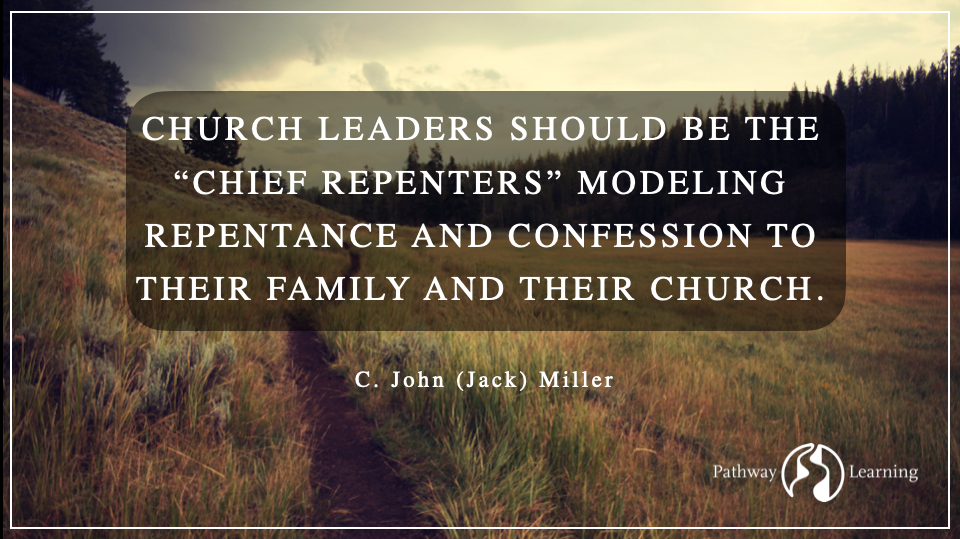How Do I Own Conflict as a Chief Repenter?: Managing Conflict Series Part 5
By Steven L. Childers
Want to go deeper?
In this book you'll be equipped from Scripture with the principles and practices needed to help you prevent and manage conflict in ministry. You’ll learn to:
Understand the ordinary dynamics of conflict (Chapter 1)
Discern the unique opportunities provided by conflict (Chapter 2)
Distinguish between healthy and unhealthy conflict (Chapter 3)
Put into practice the biblical model for resolving conflict (Chapter 4)
Repent for your role in conflict in a way that brings healing (Chapter 5)
Pursue reconciliation with others after conflict (Chapter 6)
Preview the Book
Transcript
Church leaders are called to strive for unity in the body of Christ. The apostle Paul writes to the Ephesian church, “I therefore a prisoner for the Lord urge you to walk in a manner worthy of the calling to which you have been called. With all humility and gentleness, with patience, bearing with one another in love, eager to maintain the unity of the Spirit in the bond of peace.”
The apostle Peter also writes, “so I exert the elders among you as a fellow elder and a witness of the sufferings of Christ as well as a partaker in the glory that is going to be revealed shepherd the flock of God that is among you. Exercising oversight not under compulsion but willingly as God would have you not for shameful gain but eagerly. Not domineering over those in your charge but being examples to the flock.”
One of the most significant ways that church leaders can serve as examples to the flock is through their repentance. Pastor and author Jack Miller used to call church leaders to be the chief repenters in their churches modeling repentance and confession, especially before other church leaders. Only through the Gospel can we find the power to be criticized and then to humble ourselves and confess our sins to others no matter what their response might be to us.
It's been said that one of the most liberating acts in life is to confess your sin, not only to God but to another person. The Bible says, “confess your sins to one another and be healed.” I'm afraid many leaders have never been taught how to confess our sins. Again, Ken Sande in his excellent book, Peacemaker outlines a seven-fold description of genuine confession that I think you'll find helpful.
The first mark of a genuine confession is to address everyone you have affected by your sin, not just one that you've hurt the most. Almost always our sin has affected more than one person.
A second mark is to avoid half-hearted confessions that are often conditional. Never say, “if I offended you I am sorry” or “I'm sorry I said that, but you really upset me.” A genuine confession is normally marked by no defense of your offense.
Another mark of a genuine confession is that you admit your sin specifically. You don't say, “I know I have not been a good team member.” And saying instead something like, “I know I've had a very negative attitude that has hurt the team and hurt the church.”
A fourth mark of a genuine confession is to apologize for hurting others in a way that demonstrates your sincere sorrow. Saying something like, “I'm truly sorry I failed to keep my commitment to you.” This is not a time for vague generalities but for very specific apologies.
A fifth mark is to state explicitly the consequences of your actions, showing that you aren't simply apologizing to be released from your responsibilities. You should be able to say things like, “it makes me very sad to think of how you must have felt and the pain you must have experienced as a result of what I said.”
A sixth mark of a genuine confession is for you to explain very specifically how you plan to alter your behavior in the future. You should be able to say something like, “I've now begun to see someone to help me deal with the root of this problem so that I can be more likely not to hurt others as I have hurt you.”
Finally, do not force an admission of forgiveness from the person. Allow time for healing. Sometimes people who have been deeply wounded may not be able to forgive you at the time that you ask. Sometimes it can very selfish and unloving to ask the question,” Well, do you forgive me?” Instead your role in that situation is to ensure that person of your understanding and your willingness to do whatever it takes to restore your relationship no matter how much time it may take.


